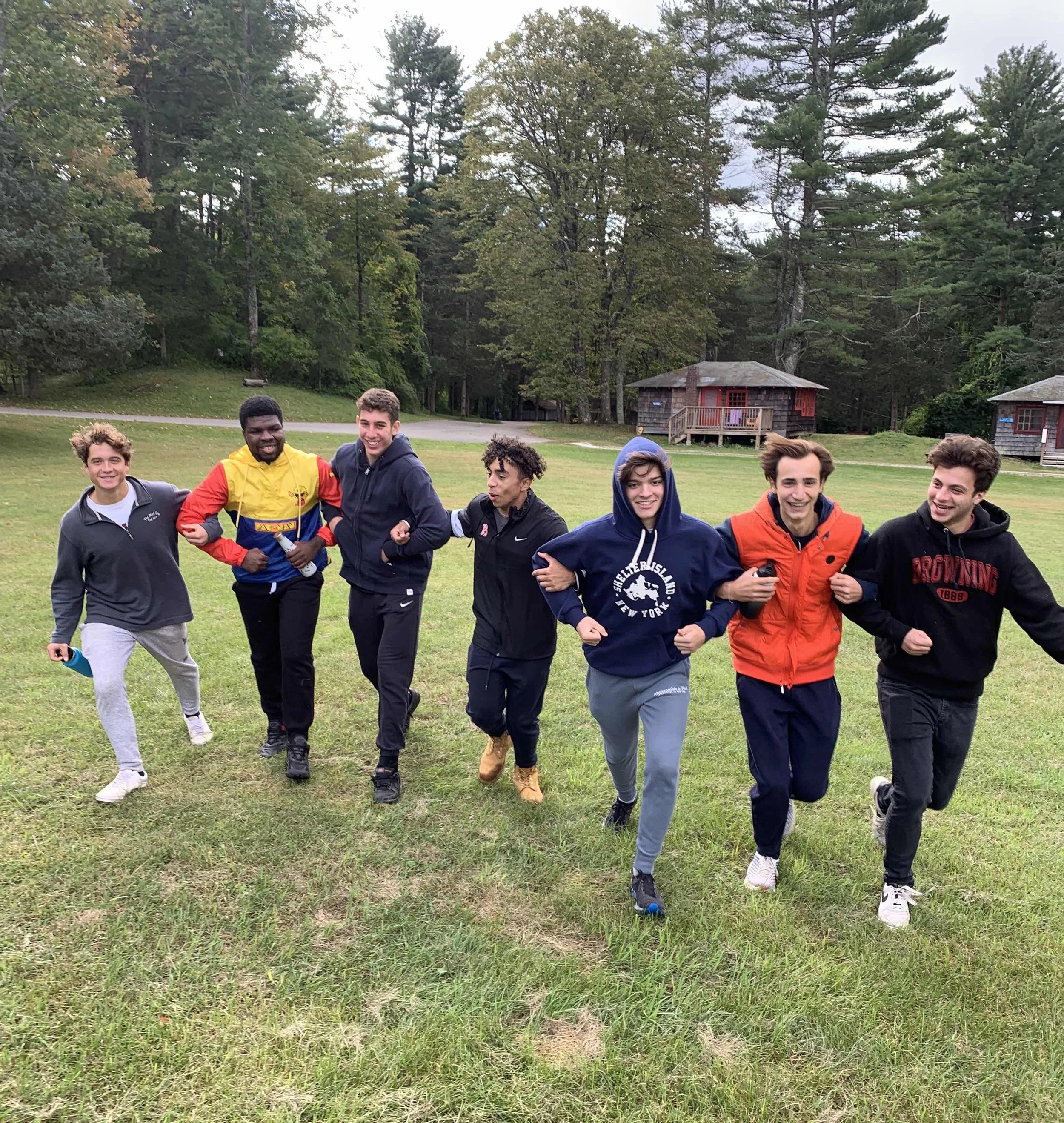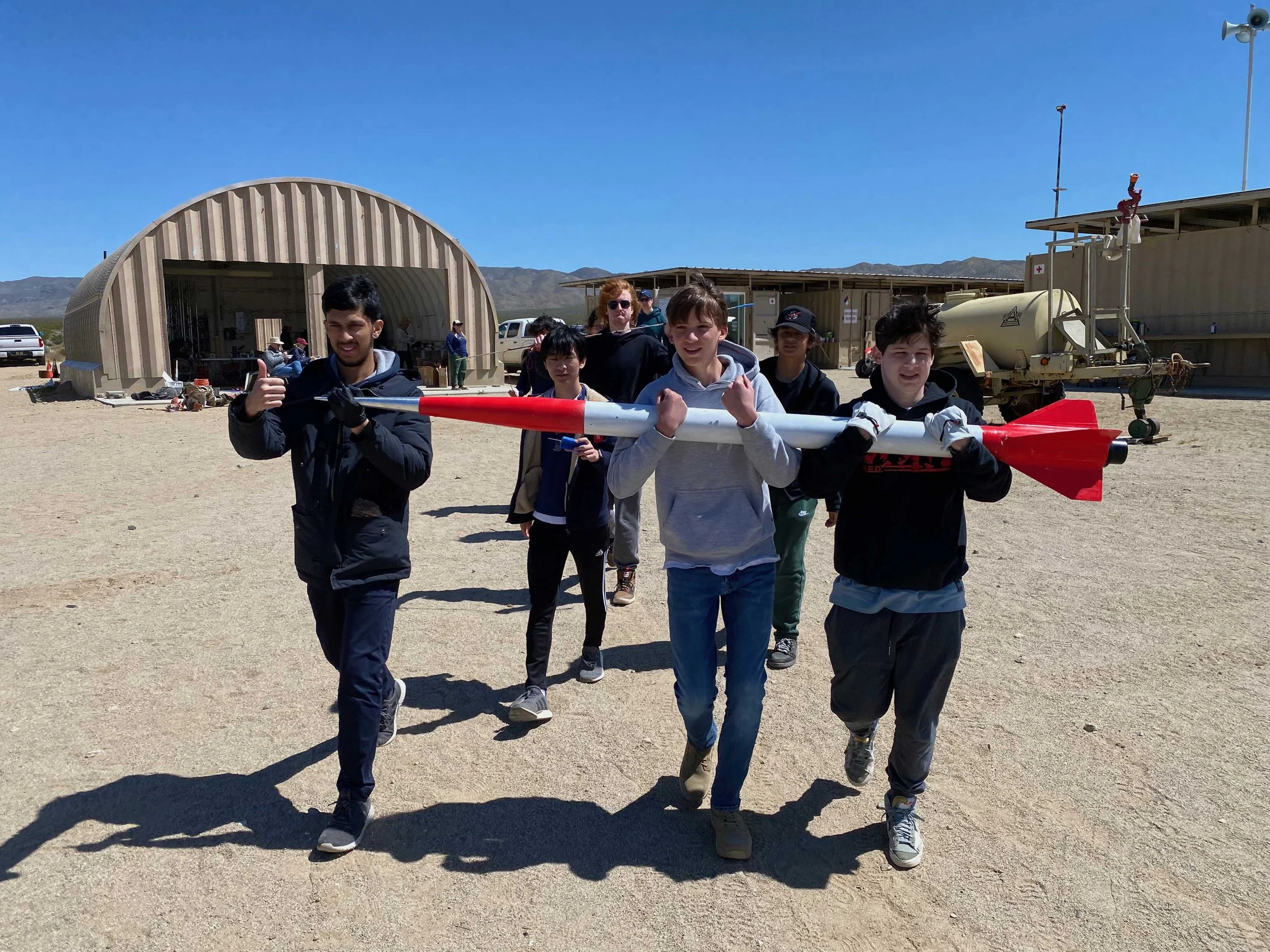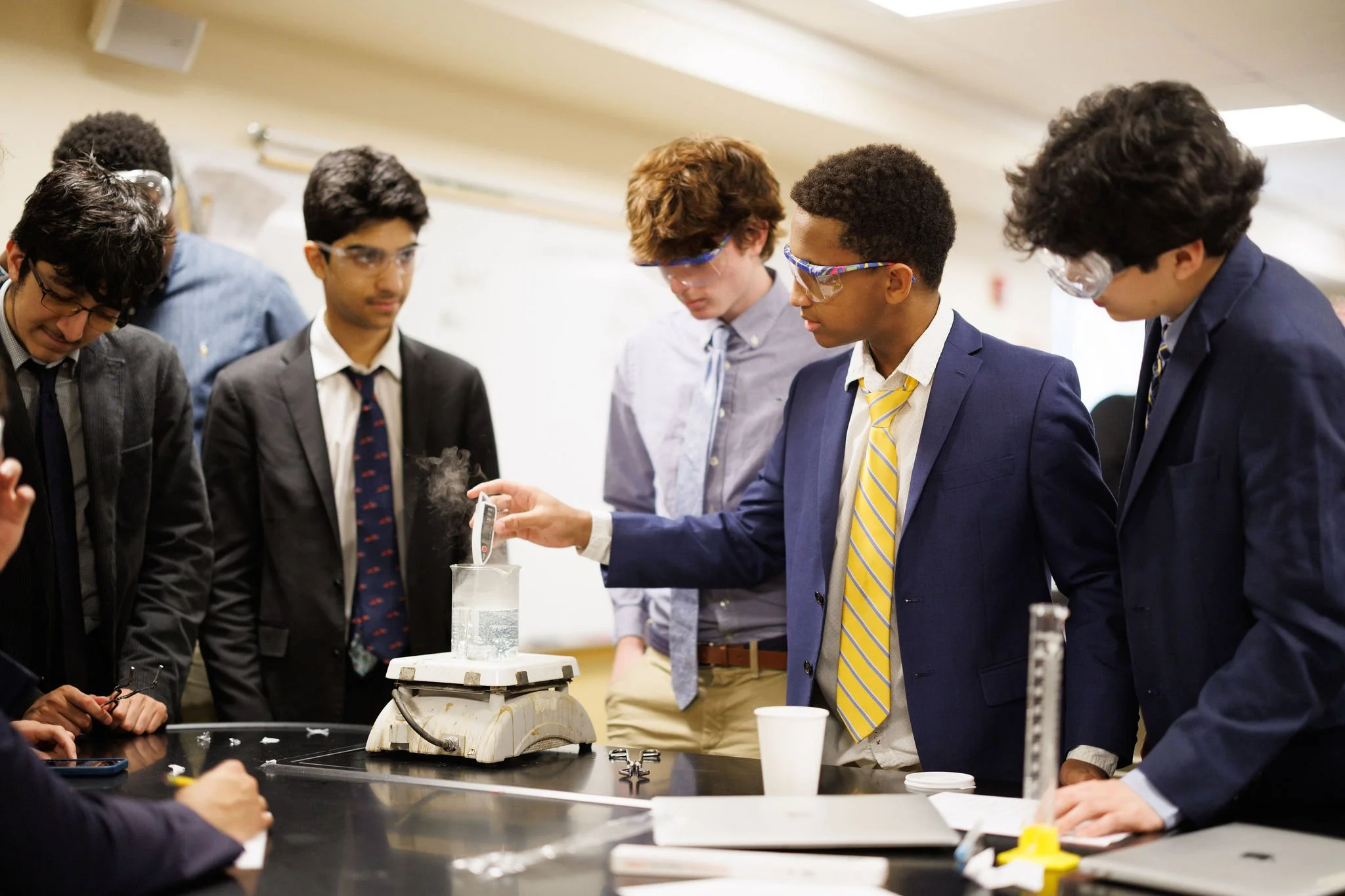Grade 9
Latin I
Upper School students new to Latin dive into the language in a comprehensible immersion classroom, which develops all four language arts (listening, reading, speaking, writing). An understanding of ancient Roman culture and how it has shaped modern life is gained alongside proficiency in language arts. Texts include Hans Ørberg’s Lingua Latina Per Se Illustrata: Familia Romana.
Latin II
Students in Latin II continue to acquire vocabulary, grammar, and syntax. We repeatedly practice verb tenses and noun cases, as well as elements of advanced grammar as they occur in our reading. Texts include Hans Ørberg’s Lingua Latina Per Se Illustrata: Familia Romana and Wheelock’s Latin. Emphasis is placed on developing reading skills. We also survey the basics of Ancient Greco-Roman mythology.
French II
This course builds on previous work in French and continues to emphasize the oral tradition as well as the acquisition of vocabulary, expressions and the fundamental principles of grammar. Vocabulary is drawn from a variety of sources, including short stories, songs and texts related to culture and history. The major verb tenses/moods are covered with particular emphasis on the forms and uses of the imparfait and the passé composé. Students also learn how to build more complex sentences through the study of object and relative pronouns. Students will go beyond the classroom to explore the city to further their study and research on various cultures of the French-speaking world and explore the target language for personal enjoyment and career possibilities. Each semester, a major project connects literature, history, and cinema to promote cultural awareness and diversity. Textbook: D’accord II + Supersite
Mandarin
Mandarin I is designed to provide students with a solid foundation in one of the world's most widely spoken languages. Throughout the course, students will learn essential Mandarin Chinese vocabulary, grammar structures, and pronunciation techniques. Emphasis will be placed on developing the four key language skills: listening, speaking, reading, and writing. Cultural components will be integrated into the curriculum, allowing students to explore various aspects of Chinese culture, including traditions, customs, holidays, and daily life. By understanding the cultural context in which the language is used, students will deepen their appreciation and understanding of Mandarin Chinese. By the end of the course, students will be equipped with the fundamental language skills necessary to engage in basic conversations, comprehend simple texts, and write basic sentences in Mandarin Chinese.
Spanish II
This course builds on previous work in Spanish and continues to emphasize the oral tradition as well as the acquisition of vocabulary, expressions and the fundamental principles of grammar. Vocabulary is drawn from a variety of sources, including short stories, songs and texts related to culture and history. The major verb tenses/moods are covered with particular emphasis on the forms and uses of the imperfect and the preterite tense. Students also learn how to build more complex sentences through the study of object and relative pronouns. Additionally, students will go beyond the classroom to explore the target language for personal enjoyment and career possibilities. Students will visit the Museum of Natural History to further their study and research on indigenous cultures of the Spanish-speaking world. Each semester, a major project connects literature, history, and cinema to promote cultural awareness and diversity.
Textbook: Descubre Ib + Supersite
Grade 10
Latin III
Students in Latin III make the transition to the reading of unadapted Latin texts with vocabulary, annotated commentary, or other forms of scaffolding. The goal of the first semester is to ensure that the students have as much reading practice as their growing skills will allow: they read from and comment on stories that steadily meet their growing understanding of the language by challenging them in terms of complexity of the language. The reading is supplemented by the study of grammar and the underlying patterns that help to enable critical knowledge of texts and the ideas contained therein. In the second semester, students begin to read adapted ancient texts to make the transition to ancient literature as successful as possible. Texts include Hans Ørberg’s Lingua Latina Per Se Illustrata: Familia Romana and Roma Aeterna.
French III
French III students are expected to gain an understanding of intermediate French grammar and verb tense structures. Emphasis is also placed on vocabulary enrichment and increased cultural awareness. Students are asked to write frequently in French, and once in English in a two- to three-page report on French history. Students are expected to master basic written French. Information on the various cultures of the French-speaking world, famous people of French descent and relevant movies are interwoven throughout the course. Textbook: D’accord III + Supersite
Spanish III
This course is designed to introduce intermediate-level students to the rich and exciting literature of the Hispanic world. This course aims to instill in students a love of modern Hispanic literature while aiding them in their desire for self-expression by learning grammar in context through reading short stories, poems, and plays. They are expected at this level to have the necessary skills that allow them to contribute with some degree of fluency to class discussions on a variety of topics. A range of well-known authors is selected for this course to enrich students’ knowledge of the great literature and renowned Hispanic literary figures such as Sandra Cisneros, Julia Alvarez, Gabriel Garcia Marquez, Ricardo Palma, Federico García Lorca, Octavio Paz, and Laura Esquivel.
Textbook: Descubre III + Supersite
Grade 11
Latin IV
Students in Latin IV immerse themselves in both ancient and more recent authentic Latin texts, which include selections from Hans Ørberg’s Lingua Latina Per Se Illustrata: Roma Aeterna, Aesop’s fables, and Fabulae Syrae, among others. The genres and notable authors of antiquity are more generally explored. Facility with poetic meters and scansion is developed. Latin is often the language used in classroom discussions and instructions. Emphasis is placed on comprehending the texts, listening and writing in Latin, and developing interpretive skills.
French IV
This course continues to focus on the four components of language: reading, writing, speaking and listening. A wide variety of cultural and geographical information pertaining to the various peoples and places of the French-speaking world, as well as vocabulary and idiomatic expressions, are presented. The goal of the course is a detailed review of grammatical structure; though discussions of complex grammatical information are sometimes conducted in English, students are otherwise expected to express themselves, both orally and in writing, exclusively in French. Activities and assessments incorporate authentic sources and are set in theme-related, real-cultural contexts. Students will visit the Metropolitan Museum of Art to further their study and research on modernist artists of the French-speaking world. Each semester, a major project connects literature, history, and cinema to promote cultural awareness and diversity. Textbook: D’accord III + Supersite; Face à Face
Reading Greek
The aim of this course is to introduce students to ancient texts in the original Greek in which they were written. Using a reading approach, students will combine language study with literary analysis as they encounter works from Homer, Plato, Herodotus, Euripides, Marcus Aurelius, Julian, Josephus, and others, covering core vocabulary, forms, and other language features along the way. (Open to juniors and seniors; because the literature we read will vary from year to year, a student may enroll in this class more than once. No prerequisites required, but a conversation with the instructor is recommended prior to enrollment.)
Spanish IV
Spanish IV aims to prepare students to communicate, explore and connect across cultures to foster attitudes of mutual understanding and respect. Vocabulary is presented visually and in context, and with Spanish synonyms and definitions at level 4. Activities and assessments incorporate authentic sources and are set in theme-related, real-life contexts. Additionally, students will go beyond the classroom to explore the target language for personal enjoyment and career possibilities. Students will visit the Metropolitan Museum of Art to further their study and research on modernist artists of the Spanish-speaking world. Each semester, a major project connects literature, history, and cinema to promote cultural awareness and diversity. Textbook: Descubre III + Supersite
Grade 12
Latin V
Students in Latin V explore the themes of imperialism and colonization in both the ancient and modern worlds. Texts include Francis Glass’ A Life of George Washington, Vergil’s Aeneid, and Caesar’s De Bello Gallico. Additionally, we attend to the voices and representations of women in Latin literature through a variety of authors, including Ovid, Catullus, and Vergil. Emphasis is placed on reading comprehension and literal translation. A secondary focus consists of examining the writers’ styles and use of literary devices. Students write short text-based essays analyzing important themes of a text and learn to back up their assertions by accurately citing the Latin. The social and cultural context of the literature is discussed on an ongoing basis.
Advanced French
The course focuses on preparing students for college courses in French. This course is designed to review the history of France from ancient Gaul to the present day. As each period unfolds, students examine landmark historical events and famous people, as well as achievements in literature, arts, science and history. Students continue to work on language skills through reading and study of magazines and newspapers, as well as through seminar discussions, oral reports and recordings. Extensive training in the organization and writing of compositions is an integral part of this language course. Students enrolled in this course traditionally sit for the Advanced Placement exam. Mastering French Vocabulary; Selections from novels; Thèmes; AP French Manuals.
Reading Greek
The aim of this course is to introduce students to ancient texts in the original Greek in which they were written. Using a reading approach, students will combine language study with literary analysis as they encounter works from Homer, Plato, Herodotus, Euripides, Marcus Aurelius, Julian, Josephus, and others, covering core vocabulary, forms, and other language features along the way. (Open to juniors and seniors; because the literature we read will vary from year to year, a student may enroll in this class more than once. No prerequisites required, but a conversation with the instructor is recommended prior to enrollment.)
Spanish V
This course covers the equivalent of an advanced college course in writing and conversation. It encompasses reading/listening comprehension and written and oral presentations. Such a course emphasizes the use of Spanish for active communication. The student will be able to comprehend formal and informal spoken Spanish, acquire vocabulary and have a grasp of structure to allow accurate reading of newspapers, magazine articles, and other modern literature texts. Also, the student will be able to compose expository passages and to express ideas orally with accuracy and fluency. Extensive training in the organization and writing of compositions is an integral part of this language course. Texts include “Preparing for the AP Spanish Language and Culture Exam” and “Temas”, as well as selected literature and articles from Spanish language press and news.
Spanish Independent Study
This course is offered to boys who have completed Advanced Spanish and desire additional study in advanced literary and cultural topics. The course is conducted entirely in Spanish and meets once or twice a week. In rare instances a student may be allowed to take an independent study concurrently with Advanced Spanish.





























